JPMorgan European Discovery Trust (JEDT) invests in European small-cap companies (excluding UK). European small caps have outperformed most other markets over the long term, although they underperformed large caps in 2022 and 2023, as the sector was confronted with a number of challenges. Against this unfavourable backdrop, JEDT underperformed as a result of asset allocation decisions. Following a strategic review, JEDT’s board appointed three new managers, Jon Ingram, Jack Featherby and Jules Bloch, who replaced Francesco Conte and Edward Greaves with effect from 1 March 2024. The trust’s relative performance has improved, and it is outpacing its peers. The new team is very excited by the outlook for the sector, and for JEDT. Several previous headwinds are now supporting European small caps, and history suggests that current low valuations are due for a substantial re-rating.
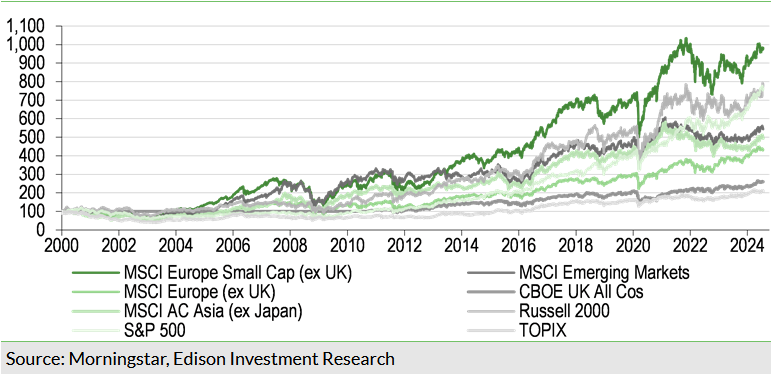
The analyst’s view
- The European small-cap sector’s long-term track record of outperformance versus most other major markets should prove a major drawcard for investors, especially as valuations are low in absolute and relative terms, and a look at previous investment cycles suggests a rebound is due soon.
- JEDT offers investors diversified access to this world-beating market and potential investors may like its recent, more balanced investment approach, and fresh focus on micro-cap companies, which is intended to fully utilise the new managers’ stock selection skills.
- JPMorgan Asset Management’s very significant fundamental research resources, combined with the use of state-of-the-art, AI-driven quantitative tools, arguably provide JEDT with a competitive edge over its peers.
- JEDT’s shares are currently trading at a discount to NAV of around 9%, and there is scope for this discount to narrow if performance remains good and/or investor sentiment towards the sector continues to improve.
NOT INTENDED FOR PERSONS IN THE EEA
JEDT: A new team, delivering a better performance
European small caps: Challenged by recent events
European small-cap companies have an outstanding long-term track record of outperformance of European large caps, and most other markets, in the 25 years since the launch of the MSCI Europe (ex UK) Small Cap Index. Small-cap companies tend to perform best in low-volatility markets and during periods of economic stability, as small businesses have less capacity to absorb market and economic shocks than their larger counterparts. So, it is not surprising that the asset class has come under pressure during the run of highly unusual events of recent years, including Russia’s invasion of Ukraine in 2022 and last year’s rapid interest rate rises.
Asset allocation decisions saw JEDT (LON:JEDT) underperform in this period, as it did not have exposure to gas, oil, defence, metals or banks – sectors that benefited from these upheavals and outpaced the market accordingly. Instead, JEDT’s portfolio was geared towards domestic economies and consumer-facing sectors, which lagged due to energy and commodity price increases, supply chain challenges, aggressive monetary tightening and slower growth. In the three years ended 31 March 2024, JEDT rose by only 3.0% in NAV terms, underperforming the MSCI Europe ex UK Small Cap Index, which rose by 6.4%.
A new management team
Following a strategic review, in February 2024 JEDT’s board announced the appointment of three new managers, Jon Ingram, Jack Featherby and Jules Bloch, who replaced Francesco Conte and Edward Greaves with effect from 1 March 2024. However, the trust’s objective, to provide capital growth from a diversified portfolio of smaller European companies (ex UK), and its investment process, remain unchanged, and the new investment team continues to be supported by JP Morgan’s strong team of European equities analysts and its state-of-the-art quantitative analysis and risk management tools.
An exciting time for European small-cap companies
Collectively, the new investment management team has 40 years’ experience investing in European small-cap companies, and they say they are ‘very excited about the current investment opportunity in the asset class’. In their view, ‘the opportunity set for alpha creation through stock picking is wider than usual’ and they are encouraged by the attractive, high-quality investment propositions they see ‘in every sector’.
Their conviction in this market is underpinned by the fact that several of the adverse influences that weighed on small caps in recent years are now supporting these businesses. Notably, interest rates have clearly peaked around the globe and expectations of lower rates are rife in all major markets, with the European Central Bank leading the way with an initial rate cut in June. In addition, real wages are growing, consumer sentiment is increasing and purchasing managers’ indices suggest activity is strengthening. Sentiment among European small-cap investors has begun to improve in response to these developments.
Valuations are low, absolutely and relatively
Valuations for European small-cap stocks are low in absolute terms and relative to other markets. As the managers observe in the company’s FY24 annual report, although European small-cap companies have benefited to some extent from the improvement in market tone since H223, the asset class has underperformed European large caps by more than 25% since September 2021 – the longest and most extreme case of underperformance in the past 20 years. There are clear signals that corporates also see value in this asset class; merger and acquisition activity has increased across Europe.
And history suggests a strong rebound is due
In the past, such periods of lagging returns from European small caps have been followed by strong outperformance. And the worse the underperformance, the stronger the subsequent outperformance (Exhibit 1). While forecasting the exact timing of any market turning point is always a challenge, this pattern suggests that the asset class is set for a potentially dramatic rebound at some point soon.
In sum, for the new investment team, ‘the outlook has rarely been brighter’ and they expect shareholders to benefit accordingly.

Recent performance on the up

Indeed, JEDT’s relative performance has already begun to improve. As mentioned above, market sentiment began to brighten in late 2023, as it became clear that the interest rate cycle was on the turn, and it has continued to improve this year. In the six months to end September 2024, the trust returned -0.5% in NAV terms. This result lagged the benchmark return of +1.6% by 2.1 percentage points, a much narrower margin than this time last year. On a share price basis, the trust returned +2.2% over the latest six-month period, ahead of the benchmark.
Stock selection has been the main contributor to this performance. Several of the company’s holdings with exposure to themes such electrification, decarbonisation and energy efficiency have been doing especially well since the beginning of the year. The main contributors to performance over this period were overweights to Bilfinger, a German engineering and construction company with a focus on heavy industrials such as the chemicals and energy sector, Fugro, a Dutch oil and gas services company that provides geo-data services for the infrastructure, energy and water industries, and SPIE, a French company providing technical engineering services to the energy and communications sectors. The main detractors were overweights to Forvia, a French auto parts supplier, and Axitron, a German business supplying equipment to the semiconductor industry.
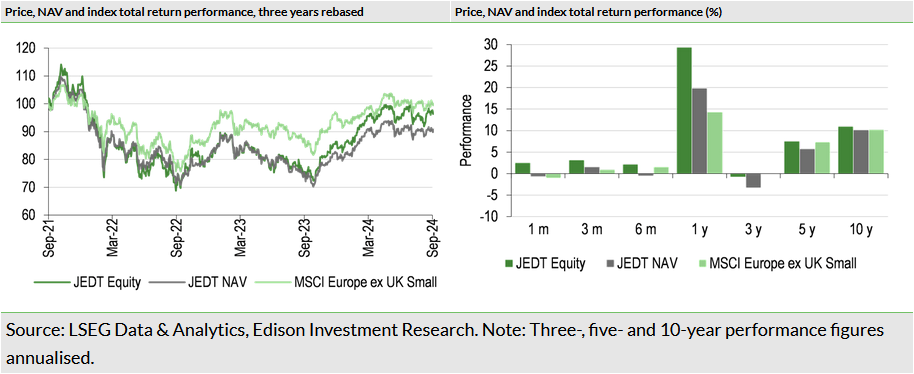
JEDT’s performance has also improved relative to its peers. Over the past year, it has outperformed all its peers in the AIC European Smaller Companies sector, as illustrated in Exhibit 4.

Discount could narrow further if performance keeps improving
JEDT’s board monitors the level of the share price discount to NAV carefully and seeks to use its ability to repurchase shares to minimise the short-term volatility and the absolute level of the discount when appropriate. During FY24 (which ended on 31 March 2024), the company repurchased 9.8m shares and has since repurchased a further 28.4m (as at 11 October 2024).
In addition, in a further effort to support the share price, the company recently undertook a tender offer for up to 15% of issued share capital. The tender price was equal to a 2% discount to the prevailing NAV per share as at the calculation date, less the costs of implementing the offer, and was completed in early September. The board also intends to introduce a performance-related tender offer for up to 15% of the issued share capital of the company if its NAV total return does not equal or exceed the benchmark total return over the five-year period beginning 1 April 2024 and ending 31 March 2029. This conditional tender offer will be subject to shareholder approval and will be made on the same terms as the recently completed tender offer.
This programme of share buybacks and tenders, combined with the recent improvement in performance, appear to have supported the share price over the past six months or so, and its discount has narrowed accordingly, to around 9% at present, compared to a long-term average of around 12.5% (Exhibit 5). However, in our view the discount has scope to narrow further if the company’s performance continues to improve and/or European small caps return to favour with investors.
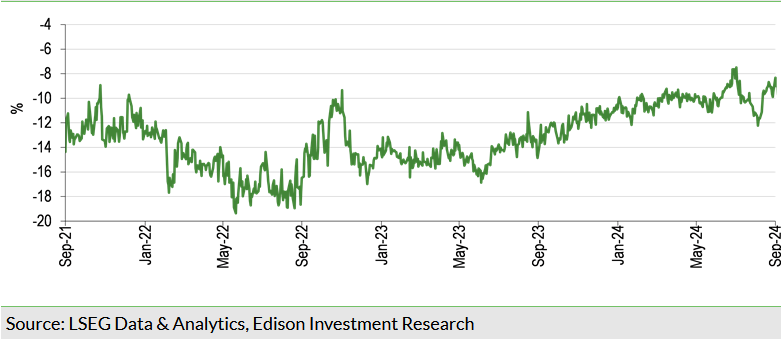
Current portfolio positioning
A more balanced approach across sectors and countries
The most notable change in positioning since the new managers assumed responsibility for the portfolio is that they have increased the portfolio’s balance across sectors and countries. In general, active sector and country positions have been pared back. This has reduced asset allocation risk, as these decisions are driven by macroeconomic developments and judgements, areas where the team feel they cannot add great value. Instead, the managers are focused on playing to their strength in stock selection – meeting companies, understanding valuations and seeking to identify ‘hidden gems’ that possess the quality, value and momentum characteristics capable of transforming them into tomorrow’s market leaders. This focus on stock selection is motivated by the lessons learned during 2022 and 2023, when performance suffered due to asset allocation decisions, as discussed above.
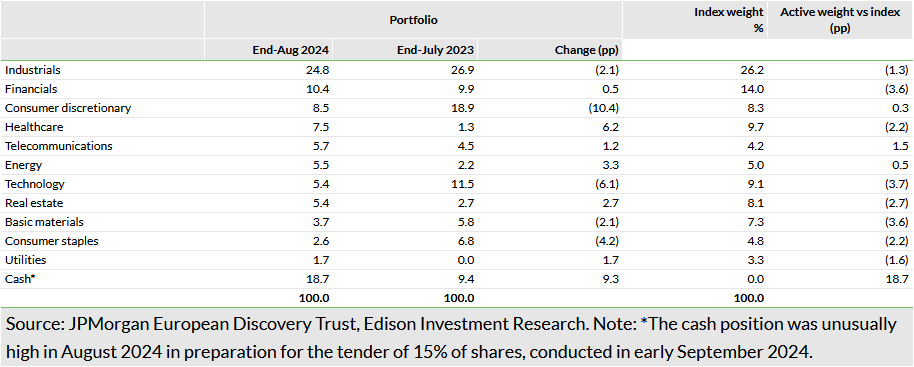
As part of this more balanced approach, the managers are more inclined than their predecessors to consider opportunities across all sectors. For example, they have increased exposure to healthcare, formerly the portfolio’s largest underweight (Exhibit 6). In their view, this sector is home to many successful large-cap companies that grew from small-cap origins, due to their capacity to innovate. They have purchased Camurus, a Swedish biotech company that has developed an innovative, slow-release drug delivery system that is very useful in the treatment of opioid addiction, and has scope for widespread application within prisons, as well as in the broader community. The system also has potential as a more efficient means of delivering anti-obesity drugs and many others.
The managers have also added exposure to energy and real estate, reducing underweights to these sectors. The war in Ukraine, combined with the transition to greener energy sources, has transformed the energy sector. Demand for liquid natural gas (LNG) has surged, due to its clean energy credentials and its appeal as an alternative to Russian oil and gas. JEDT’s managers have invested in GTT, a French oil and gas equipment and services company specialising in LNG transport systems. Within the real estate sector, they expect companies with strong balance sheets to see their assets revalued upwards as interest rates decline. However, the market still seems sceptical of this potential, so valuations remain low. The team has purchased TAG Immobilien, a German residential real estate management and development company, and Merlin Properties, a Spanish REIT focused on data processing and storage centres, at attractive levels. The investment in Merlin Properties also provides exposure to the surging demand for artificial intelligence (AI) tools, which has dramatically increased the need for purpose-built premises to house AI-related infrastructure. Both TAG and Merlin are now top 10 holdings (Exhibit 8). The increased exposures to healthcare, energy and real estate have been funded by some reduction in exposures to consumer goods and technology.
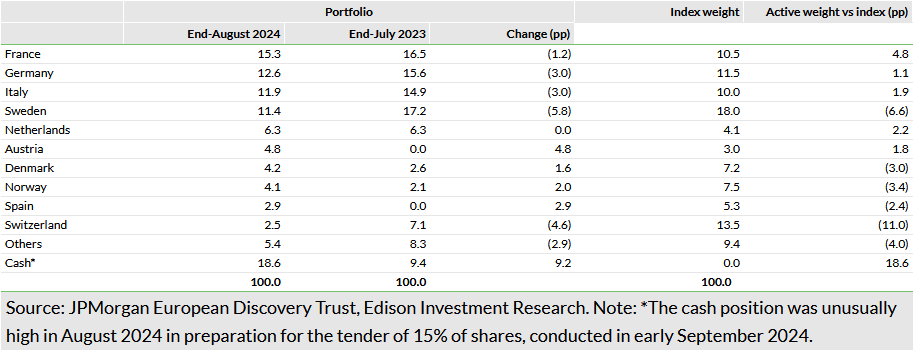
Within JEDT’s investment process, stock selection drives country allocations, but the managers do monitor exposure on this basis. Over the past year, the trust’s overweights to France, Germany and Italy decreased significantly, while underweights to Austria, Denmark, Norway and Spain have been pared back. Underweights to Sweden and Switzerland have increased (Exhibit 7).
JEDT’s ongoing, albeit smaller overweight to France is a function of the fact that for the managers, this market offers many high-quality service companies operating in several sectors, including catering, hospitality and engineering, some of which are generating significant growth outside of France. Yet nervousness about France’s July elections contributed to weakness in this market, increasing its attractiveness to JEDT’s managers, who viewed pre-election jitters as overdone. In their view, even if Marine Le Pen’s far right National Rally party had won power, the long-term financial market ramifications would have been limited, as proved the case in Italy following the appointment of the far right’s Giorgia Meloni as prime minister in 2022.
Another factor that distinguishes the management style of the new team is their increased focus on micro companies. Historically, the trust was reluctant to venture too far down the scale in terms of market cap, but the new managers believe there are ‘amazing’, attractive opportunities in this area of the market that are ripe for discovery: hidden gems that are typically overlooked and undervalued by other investors due to their lack of liquidity. They argue that larger companies offering the same earnings growth would be trading at double the multiples of these companies, so there are clear advantages to investing at this early stage of their development, where they can be acquired cheaply, before they realise their full growth, and valuation, potential.
As a result, the trust has five or six small positions that together comprise c 4% of the portfolio, where the managers see ‘really good, long-term potential for share prices to increase by several multiples’. Holdings include Puuilo, a Finnish operator of discount stores. It currently has around 40 stores in Finland and is aiming to increase this to 80 over the next five years, which will require annual growth of 15%. They also hold VBG, a Swedish auto parts maker. These companies are doing well and outperforming, and the managers expect this good performance to ‘snowball over time’.
In sum, the team has taken advantage of some of the many opportunities available at the moment, across this currently undervalued asset class, although the number of portfolio holdings has decreased slightly to 70 from 76 over the past year.
Recent acquisitions have been funded in part by a reduction in exposure to automakers. The managers were attracted to names in this industry by very low valuations, but the sector derated after Russia’s invasion of Ukraine, as production costs rose, and demand declined. The managers are also concerned that Europe’s high-quality, luxury vehicle makers may be structurally disadvantaged as many new suppliers of basic, low-cost EVs are emerging in China and the Asian region. As a result of these concerns, the team has sold Forvia, which has detracted from performance, as mentioned above, and Melexis, a Belgian manufacturer of semiconductors used in vehicles.
The managers stress that in broad terms, the improvement in recent performance means they are reluctant to make too many changes to the portfolio. (Annual portfolio turnover remains at around 70%, close to the long-term average.) Nonetheless, the names comprising the trust’s top 10 holdings have changed markedly over the past year since our last note (Exhibit 8). Only SPIE, now JEDT’s largest holding, and German entertainment and ticketing company CTS Eventim remain in the list. Newcomers include the number three holding, Bilfinger, purchased in mid-2023. Bilfinger’s new management is improving risk controls and pricing, which the investment team expects will improve operating margins. The top 10 list also reflects the managers’ balanced investment approach. There are no large, concentrated positions. Each of the holdings represents around 2% total portfolio assets.
Portfolio gearing stood at 5.3% (as at 20 September 2024), not far off the gearing level of 5.5% at end September 2023, reflecting the managers’ positive view of the outlook for European small caps.
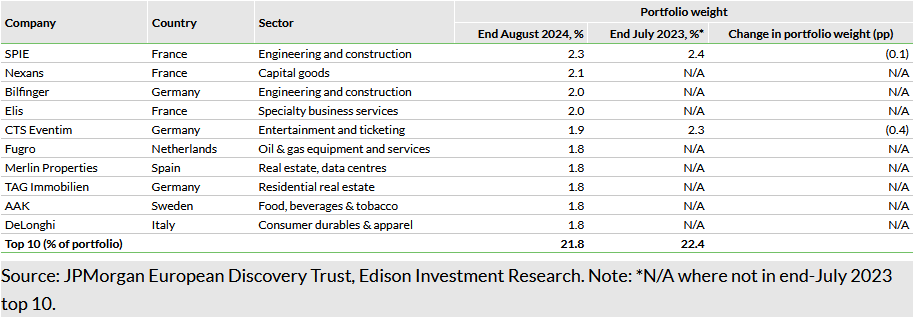
Dividends
JEDT’s dividend policy aims to pay out the majority of revenue available each year, although the company’s objective is to maximise capital growth, so the managers are not constrained to deliver income in any one financial year, and the dividend will vary from year to year, as it is a function of portfolio dividend income.
An interim dividend for the financial year ended 31 March 2024 (FY24) of 2.5p per share was paid in February 2024 (FY23: 1.2p/share). This rise reflected increased portfolio income during the first six months of the financial year, compared to the previous one. A final dividend of 8.0p per share was paid on 2 August 2024, taking the total dividend for FY24 to 10.5p, an increase of 16.7% on the total dividend of 9p per share for FY23. This represents a yield of 2.3% based on the current share price.
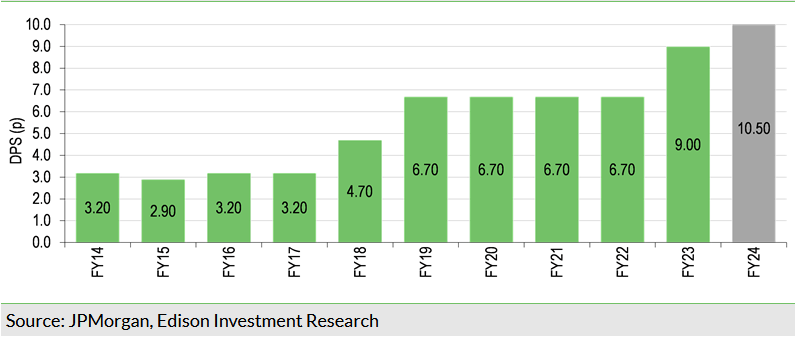
The board
JEDT’s board comprises five independent non-executive directors. Nicholas Smith retired from the board in July 2024, having served as a director since 2015. Arun Sarwal succeeds Smith as audit chair and Sarah Watters has taken over the role of senior independent director.
In anticipation of Smith’s retirement, in June 2024 it was announced that James Will was appointed as a director of the board, effective from July 2024. Will has extensive investment company experience. His other non-executive directorships include the chairmanship of Asia Dragon Trust and senior independent director for Herald Investment Trust.

In terms of board diversity, the current gender balance of three men and two women directors exceeds the target of 33% of women on UK 350 company boards set under the Hampton-Alexander Review. The board also complies with the recommendations of the Parker Review in respect of board diversity.
For details of the trust’s profile, investment policy and fees, see our July 2022 report.
___________________________________________________
General disclaimer and copyright
This report has been commissioned by JPMorgan European Discovery Trust and prepared and issued by Edison, in consideration of a fee payable by JPMorgan European Discovery Trust. Edison Investment Research standard fees are £60,000 pa for the production and broad dissemination of a detailed note (Outlook) following by regular (typically quarterly) update notes. Fees are paid upfront in cash without recourse. Edison may seek additional fees for the provision of roadshows and related IR services for the client but does not get remunerated for any investment banking services. We never take payment in stock, options or warrants for any of our services.
Accuracy of content: All information used in the publication of this report has been compiled from publicly available sources that are believed to be reliable, however we do not guarantee the accuracy or completeness of this report and have not sought for this information to be independently verified. Opinions contained in this report represent those of the research department of Edison at the time of publication. Forward-looking information or statements in this report contain information that is based on assumptions, forecasts of future results, estimates of amounts not yet determinable, and therefore involve known and unknown risks, uncertainties and other factors which may cause the actual results, performance or achievements of their subject matter to be materially different from current expectations.
Exclusion of Liability: To the fullest extent allowed by law, Edison shall not be liable for any direct, indirect or consequential losses, loss of profits, damages, costs or expenses incurred or suffered by you arising out or in connection with the access to, use of or reliance on any information contained on this note.
No personalised advice: The information that we provide should not be construed in any manner whatsoever as, personalised advice. Also, the information provided by us should not be construed by any subscriber or prospective subscriber as Edison’s solicitation to effect, or attempt to effect, any transaction in a security. The securities described in the report may not be eligible for sale in all jurisdictions or to certain categories of investors.
Investment in securities mentioned: Edison has a restrictive policy relating to personal dealing and conflicts of interest. Edison Group does not conduct any investment business and, accordingly, does not itself hold any positions in the securities mentioned in this report. However, the respective directors, officers, employees and contractors of Edison may have a position in any or related securities mentioned in this report, subject to Edison's policies on personal dealing and conflicts of interest.
Copyright: Copyright 2024 Edison Investment Research Limited (Edison).
Australia
Edison Investment Research Pty Ltd (Edison AU) is the Australian subsidiary of Edison. Edison AU is a Corporate Authorised Representative (1252501) of Crown Wealth Group Pty Ltd who holds an Australian Financial Services Licence (Number: 494274). This research is issued in Australia by Edison AU and any access to it, is intended only for "wholesale clients" within the meaning of the Corporations Act 2001 of Australia. Any advice given by Edison AU is general advice only and does not take into account your personal circumstances, needs or objectives. You should, before acting on this advice, consider the appropriateness of the advice, having regard to your objectives, financial situation and needs. If our advice relates to the acquisition, or possible acquisition, of a particular financial product you should read any relevant Product Disclosure Statement or like instrument.
New Zealand
The research in this document is intended for New Zealand resident professional financial advisers or brokers (for use in their roles as financial advisers or brokers) and habitual investors who are “wholesale clients” for the purpose of the Financial Advisers Act 2008 (FAA) (as described in sections 5(c) (1)(a), (b) and (c) of the FAA). This is not a solicitation or inducement to buy, sell, subscribe, or underwrite any securities mentioned or in the topic of this document. For the purpose of the FAA, the content of this report is of a general nature, is intended as a source of general information only and is not intended to constitute a recommendation or opinion in relation to acquiring or disposing (including refraining from acquiring or disposing) of securities. The distribution of this document is not a “personalised service” and, to the extent that it contains any financial advice, is intended only as a “class service” provided by Edison within the meaning of the FAA (i.e. without taking into account the particular financial situation or goals of any person). As such, it should not be relied upon in making an investment decision.
United Kingdom
This document is prepared and provided by Edison for information purposes only and should not be construed as an offer or solicitation for investment in any securities mentioned or in the topic of this document. A marketing communication under FCA Rules, this document has not been prepared in accordance with the legal requirements designed to promote the independence of investment research and is not subject to any prohibition on dealing ahead of the dissemination of investment research.
This Communication is being distributed in the United Kingdom and is directed only at (i) persons having professional experience in matters relating to investments, i.e. investment professionals within the meaning of Article 19(5) of the Financial Services and Markets Act 2000 (Financial Promotion) Order 2005, as amended (the "FPO") (ii) high net-worth companies, unincorporated associations or other bodies within the meaning of Article 49 of the FPO and (iii) persons to whom it is otherwise lawful to distribute it. The investment or investment activity to which this document relates is available only to such persons. It is not intended that this document be distributed or passed on, directly or indirectly, to any other class of persons and in any event and under no circumstances should persons of any other description rely on or act upon the contents of this document.
This Communication is being supplied to you solely for your information and may not be reproduced by, further distributed to or published in whole or in part by, any other person.
United States
Edison relies upon the "publishers' exclusion" from the definition of investment adviser under Section 202(a)(11) of the Investment Advisers Act of 1940 and corresponding state securities laws. This report is a bona fide publication of general and regular circulation offering impersonal investment-related advice, not tailored to a specific investment portfolio or the needs of current and/or prospective subscribers. As such, Edison does not offer or provide personal advice and the research provided is for informational purposes only. No mention of a particular security in this report constitutes a recommendation to buy, sell or hold that or any security, or that any particular security, portfolio of securities, transaction or investment strategy is suitable for any specific person.
London │ New York │ Frankfurt
20 Red Lion Street
London, WC1R 4PS
United Kingdom
